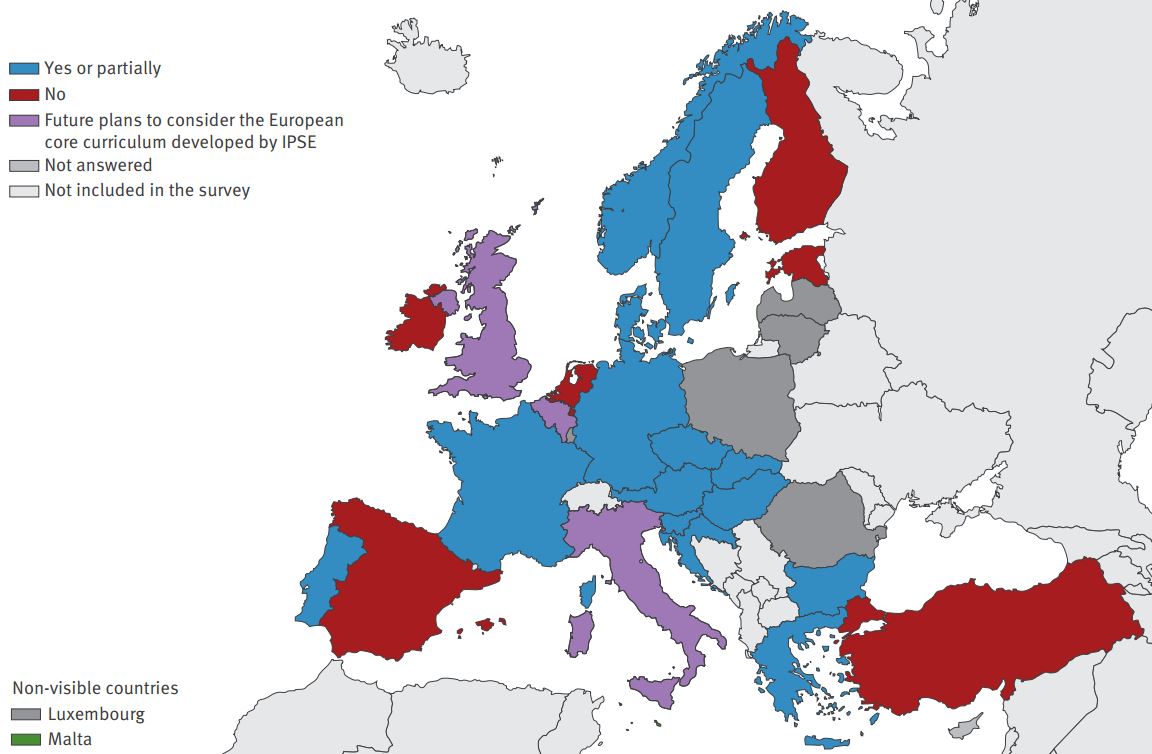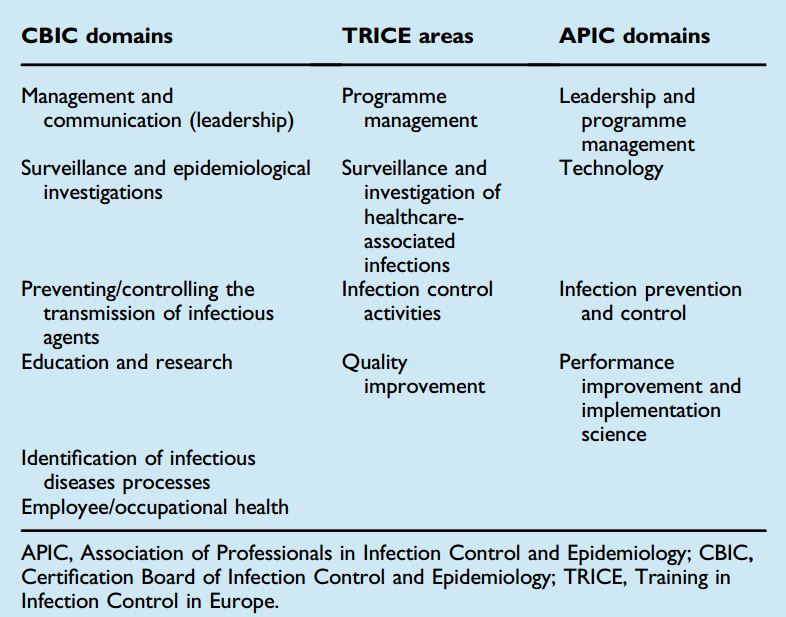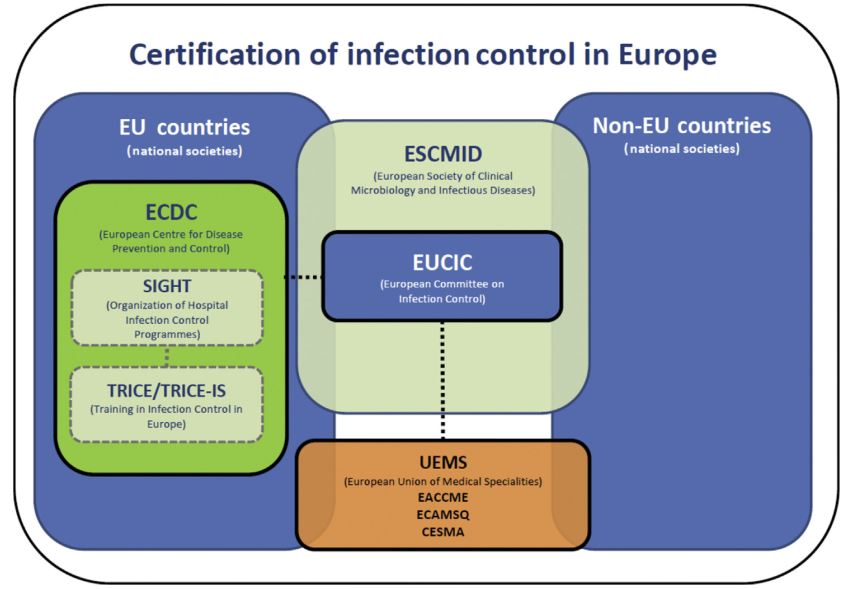Preventing healthcare-associated infections is a responsibility of everyone in a hospital. Still, infection prevention and control activities need to be organized by competent experts [1]. Many reports claim a shortage of qualified infection control doctors and nurses [2]. What does “qualified” actually means?
There is still heterogeneity in infection control training opportunities and qualifications among European countries [1]. There is no European-wide recognized Master or PhD program or European Board certification for doctors specializing in infection control [2].
A good example: the USA
In the United States, IPC certification is provided by the CBIC (Certification Board of Infection Control and Epidemiology). CBIC is an independent multidisciplinary board, their certificate is valid for 5 years. The certificate is obtained by passing a computer-based multiple-choice exam, questions based on core competencies [1]. ‘Competencies’ mean what the individual will know, understand and be able to do at the end of the learning process. The term ‘core’ indicates that these should be common to all professionals [3]. Every 5 years, CBIC adjusts the list of core competencies with a questionnaire, sent to a large number of infection control professionals in the USA [1].
According to APIC (Association for Professionals in Infection Control and Epidemiology), three levels of infection control expertise exists; novice, proficient, and expert. The APIC suggests certification (in form of CBIC credentials) taking place between novice and proficient levels [1].
Europe
Unfortunately, no similar certification organization exists in Europe. UEMS (Union Européenne Des Médecins Spécialistes – European Union Of Medical Specialists) provides medical education accreditation, but infection control is not represented yet [1]. In 2008, UEMS established the ECAMSQ (European Council for Accreditation of Medical Specialist Qualifications), for harmonizing medical training and for the recognition of professional qualification [4].
IPSE
In 2005, the IPSE (Improving Patient Safety in Europe) project was formulated to further develop existing surveillance initiatives, and to support the wider infection control efforts in Europe. One of the project’s aspects was “strengthening the status of professionals involved in infection control activities” [5].
IPSE was developed in collaboration with ESCMID (European Society of Clinical Microbiology and Infectious Diseases), WHO (World Health Organization), the European Union, the UK Health Protection Agency, some major public health institutes and EU supported networks [1, 5].
In 2006, within the framework of the project, a survey was carried out in 28 countries, to identify consensual tasks for the infection control professionals. Based on the identified consensual tasks, a so-called “core curriculum” has been created; listing required competencies, basic knowledge and skills of an infection control professional [5].
The IPSE core curriculum had been used to develop or update 28 national infection control or hand hygiene courses [2].

Figure 1: Existing infection control or hospital hygiene training courses based on IPSE core curriculum
(Source: Brusaferro et al. 2014)
At the end of the IPSE project, the responsibility for the activities was transferred to the ECDC (European Centre for Disease Prevention and Control) [5].
TRICE
The TRICE (Training in Infection Control in Europe) project was initiated by the ECDC, as the next step through the harmonization process. A list of core competencies for infection control professionals was created, on the basis of the IPSE project’s core curriculum [1]. Core competencies were evaluated by a questionnaire, and approved by National Representatives [2].
What are these core competencies for infection control professionals in Europe? [3]
Program management
- Elaborating and advocating an infection control programme
- Management of an infection control programme, work plan and projects
Quality improvement
- Contributing to quality management
- Contributing to risk management
- Performing audits of professional practices and evaluating performance
- Infection control training of employees
- Contributing to research
Surveillance and Investigation of healthcare-associated infections
- Designing a surveillance system
- Managing a surveillance system (implementation, follow-up, evaluation)
- Identifying, investigating and managing outbreaks
Infection control activities
- Elaborating infection control interventions
- Implementing infection control procedures in healthcare
- Contributing to reducing antimicrobial resistance
- Advising appropriate laboratory testing and use of laboratory data
- Decontamination and sterilisation of medical devices
- Controlling environmental sources of infections
Is it similar to the core competencies used in the United States?
It is, there are some common characteristics, as Figure 2 shows.
 Figure 2: Core competency as defined by different associations and projects.
Figure 2: Core competency as defined by different associations and projects.
(Source: Zingg et al. 2015)
EUCIC
ESCMID launched EUCIC (European Committee of Infection Control) in 2014 with the aim of establishing a European certificate for infection control professionals. EUCIC is a standing committee, its relationship to other organizations and committees is shown in Figure 3 [1].
 Figure 3: Collaboration between existing European bodies to achieve infection control certification.
Figure 3: Collaboration between existing European bodies to achieve infection control certification.
(Source: Zingg et al. 2015)
Conclusion
Hopefully, we do not have to wait too long for a Europe-wide infection control training and certification program, as the harmonization process is promising. Training will have to be based on the TRICE core competencies, and EUCIC will have a key role in establishing the certification.